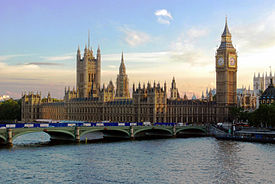Britain currently has a pretty bad crop of Members of the House of Commons. Second, or in the case of Richard Burgon and Claudia Webbe third rate, intellects currently make up the bulk of the Commons and who spend their time pushing second rate policies and ideologies in an environment that plainly does not attract the very best of minds. Whilst £80,000 is a lot of money for the majority of Britons, it’s not enough to attract the sort of people and the sort of intellects that could probably command ten times that in business or industry. Let’s face it if you were the sort of high flyer in a multinational manufacturing company or someone who had built a solid reputation in trade or in the City, would you choose to go into Parliament where not only will you be subjected to the slings and arrows of public opinion or party discipline but will also be paid less than you could earn elsewhere? The answer is you would not. You’d stay in the business environment where you could earn hundreds of thousands or even millions rather than step down and enter politics.
The problem with the current system is that the wages for Parliamentarians are high enough to attract silver tongued grifters and chancers and to bring in that much smaller number who have a genuine calling to do good for the people of Britain. But they are not high enough to attract the big brains that are needed to deal with big problems.
In the private sector you cannot go from school, Oxbridge and then on into a high paying high responsibility job, unless of course you are an entrepeneur with a start up. Even if you come via a good school and Oxbridge, in the private sector you would usually have to work your way up the different levels, proving yourself along the way. That’s not the way it works with the House of Commons. It is quite possible to become an MP with no real experience of the real world of business whatsoever. A person could do a PPE at Oxbridge, become a Parliamentary researcher or do a short period in a think tank or a trade union and then be considered by your particular party as suitable material to be an MP. The current system does nothing to attract those of the intellectual calibre who would otherwise become doctors, scientists or leaders of small and medium size enterprises. It certainly does not appeal to those who work in industry or retail who could not afford to take five years or more out of their lives to become an MP and who might then find it difficult to get back into their regular profession should they be defeated at an election.
Paying MP’s more might also reduce the amount of second jobs scandals that the House of Commons is regularly plagued with. Paying enough so that people don’t have to concern themselves with outside employment could go some way to making the Commons or rather its members more honest.
MP’s first started getting proper regular annual salaries in 1911 and in my view this was a great help to getting more working class members in the House. The annual salary of £400 as of 1911 which was roughly as far as I can make out the annual salary of a skilled person such as a surgeon and three times that of a skilled manual worker such as a shipbuilder. The relatively high wages at the time for Parliamentarians attracted those who would otherwise gone into one of the professions or those who were skilled workers in industry. About the only profession that paid more than being an MP in 1911 as far as I can ascertain was the legal profession and because of that pay level it meant that being an MP and a lawyer was probably quite lucrative at the time.
As the 1911 MP’s salary was about three times that of a very skilled worker in for example shipbuilding then there could be a case for making the base rate of an MP three or four times that of the average wage which in the UK is currently about £29k in order to attract the best people. It’s quite possible that raising the salary even higher, say to around £150k for a baseline MP and doing away with most of the expenses (except staff and housing) that they currently get might remove the regular expenses scandals that afflict the House of Commons and its members.
I realise that this suggestion of paying MP’s more is not going to be popular but there is a saying that if you pay peanuts then you get monkeys and the people of Britain deserve better than being represented by third rate intellect monkeys like Richard Burgon et al. If going into Parliament was an attractive prospect for the bright and the skilled and those who could do or have done very well in the private sector then maybe we might get better MP’s to represent us. At present the Commons on the Conservative side attracts a lot of those from the legal profession who already can earn good money outside but who can combine serving in the House with legal practise. It also, for Labour, attracts those who have done little apart from ‘work’ in public sector management or who have climbed on the trade union gravy train. These are often the people who could not get proper jobs in any part of the private sector outside of the legal profession and who are too often the sort of people who most of us would not trust to sit the correct way around on a toilet, people such as ex-NHS managers for example.
We need better and more responsive and responsible MP’s, on that I believe that many people would agree. Paying decent money to attract decent and hard working individuals might just be one way to get the sort of representation that we deserve.
The only real problem with increasing the pay for MP’s to the sort of level that a competent and talented person could expect in the private sector is that at least for a while this increased money would go to some of the current crop of less than stellar MP’s who inhabit the Commons. However as time goes by it might end up attracting a better quality of candidate to the Commons and also attract candidates who are more independent of mind and who are not as slavishly bound to party rules than the current MP’s. A person who knows that they could go back into the private sector and earn more than decent money is going to be less frightened of losing their MP’s salary for speaking out either in representation of their constituents or voicing their conscience. You don’t get that independence of mind from those who have come into Parliament because they owe favours to trade unions or the public sector or their wealthy friends.






I made this suggestion over 20yrs ago. Likewise, the prime minister’s salary is a sick joke for not just heading the country, but for the brickbats thrown over the period. The PM should be on £500k, the chancellor £400k and cabinet ministers £250k. There should also be open primaries so that the public at least have a fighting chance of knowing what they’re getting. Time too, to insist on a range of educational or natural talents to bring to the table. Too many tainted graduates of our marxist infested Univershitty Halls of Knackerdemia, with useless or overrepresented degrees. There needs to be a root and branch limiting of what can be deemed as expenses especially 2nd homes, possibly replaced with a term-limited free travel warrant. Lastly and most importantly, the civil service, public bodies, courts and committees need to be cleared of the politicised placemen and party hacks, activists and stooges that have become the norm since Blair was elected.
As a some time active member of the Conservative party I can say that it doesn’t matter how good a candidate might be they will not be selected if they are not part of the inner circle. If your face doesn’t fit and you are not part of the right set you will get nowhere. I have seen very able local candidates passed over and carpet baggers put up for seats for just these very reasons. Even when the local voters refuse to vote for carpet baggers and seats are repeatedly lost the practice still carries on regardless.
I think another side to this is that corporate apparatchiks (& bosses) in both public and private sectors are grossly overpaid, often for nothing-burger jobs, such as DIE or is that IED posts in both sectors.
Can anyone really EARN at 7 figure sum annually?
I’ve often thought that there should be a maximum income rule, some multiple of the minimum paid to a companies workers, to curtail this trend.
In the last 20 years we have seen a massive concentration of wealth in the top handful of percent of the population at the expense of the middle classes in particular.
Today slightly less than 1% of the world’s adult population collectively controls 46% of the world’s wealth and the trend is continuing.
(https://www.visualcapitalist.com/global-wealth-concentration/)
I must say I agree with you somewhat! Also MPs do not exactly have job security, they can be vored out after five years in theory, but affecting those in marginal as opposed to safe seats more.
Pay better money, attract better people and compensate them for the fact that they might not be in the job that long
*voted